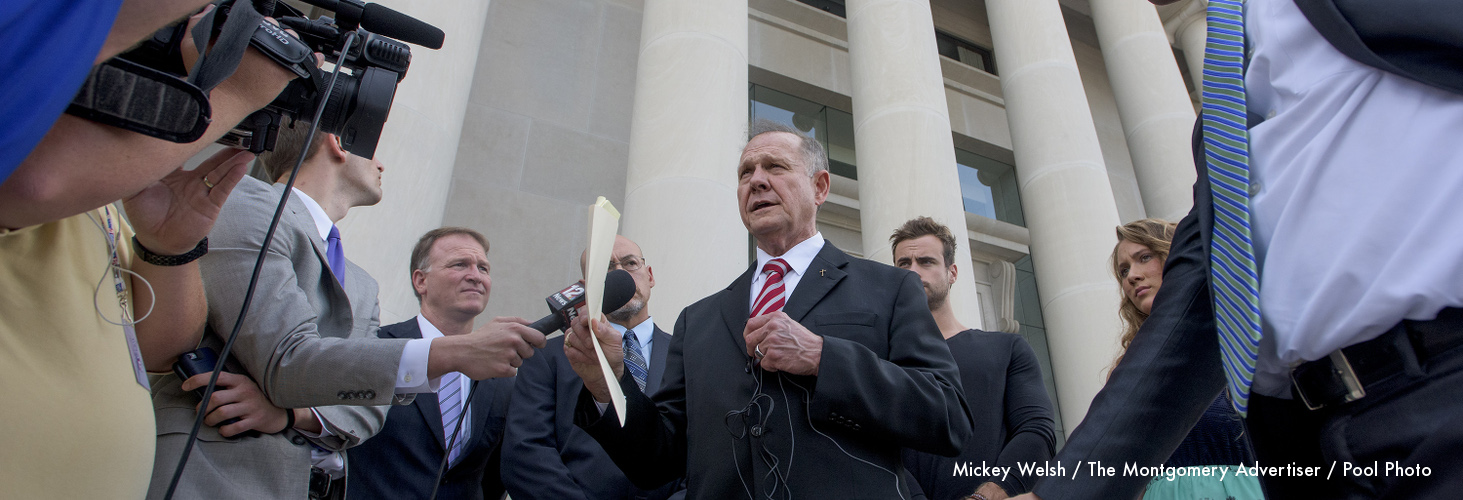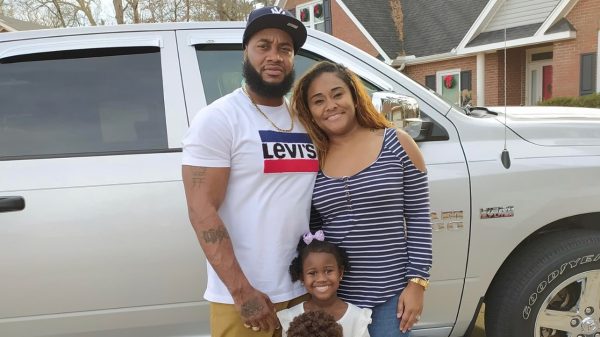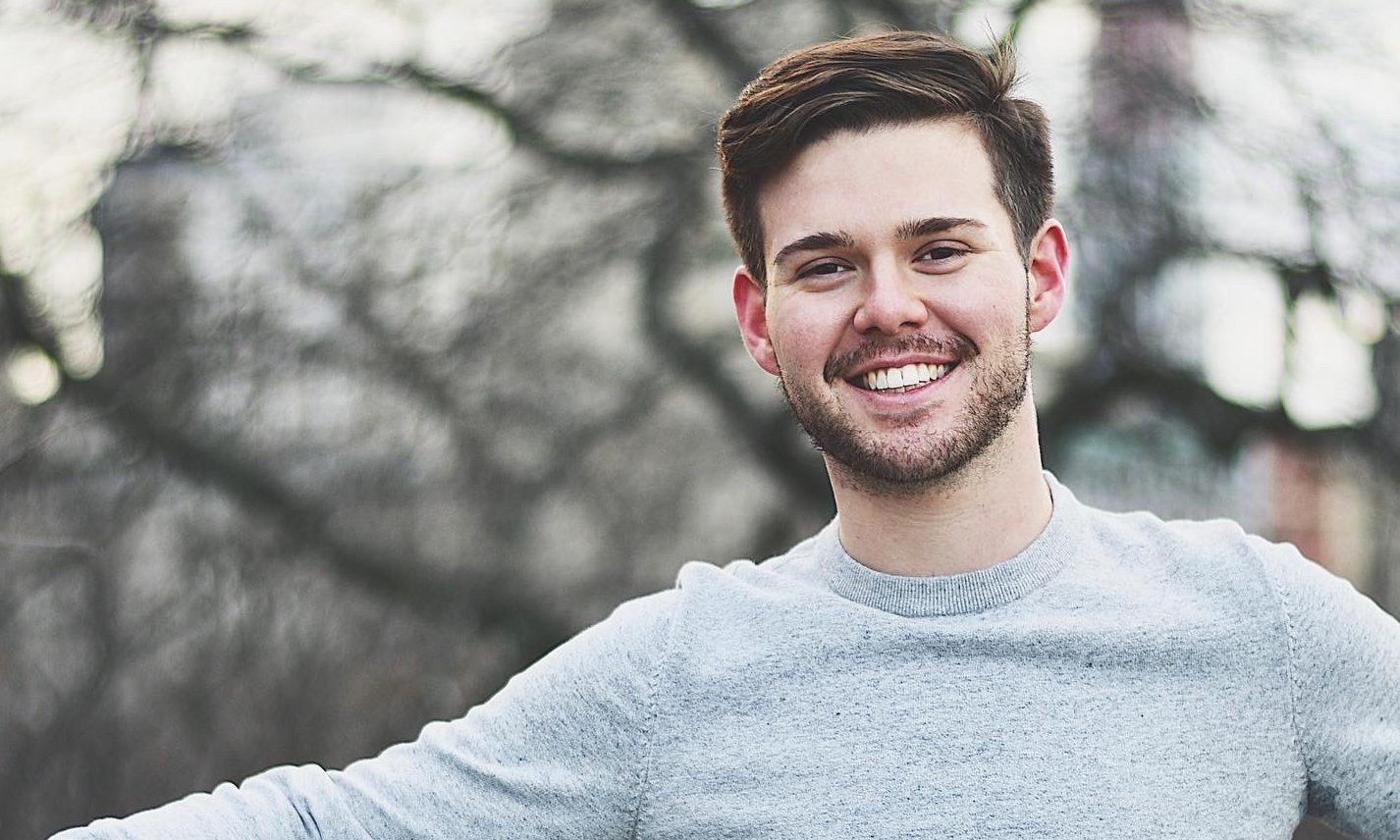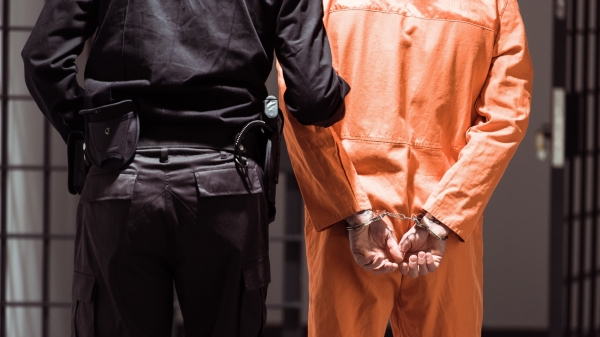By Chip Brownlee
Alabama Political Reporter
MONTGOMERY—Alabama Supreme Court Chief Justice Roy Moore has sent his first brief to the 7-member Special Supreme Court that will hear the appeals case over his suspension in September for violating judicial ethics.
The 95-page brief, filed by his attorneys at the Liberty Counsel on his behalf, argues that the Court of the Judiciary overstepped its authority by voting to suspend the Chief Justice for the remainder of his term. They say his suspension and the charges against him should be overturned. He first filed paperwork for his appeal in October.
“The JIC violated the rule of law and the COJ shamefully violated clear law when it de facto removed Chief Justice Moore when the order admits the Court did not have the required unanimous vote to remove,” said Mat Staver, Moore’s lead attorney and founder of the Liberty Counsel.
Alabama law under COJ Rule 16 requires the COJ, a nine-member judicial oversight panel, to vote unanimously to remove a judge from the bench, but the COJ evaded that requirement by using a simple majority vote to suspend Moore for the remainder of his term.
“The COJ’s power to punish judges should not be enlarged, as has been done in this case, by any other means than the constitutionally designated rule-making process,” the brief reads.
The only difference between Moore being formally removed and his current suspension is that the Chief Justice gets to keep his title for the next two years and two months, but has none of the authority that comes with it, nor his office or his pay check. Acting Chief Justice Lyn Stuart has assumed his job since his suspension.
“The enormity of the COJ’s gross excess of authority has profound implications for the judicial independence of every appellate, circuit, district, and probate judge in the state,” Moore’s attorneys wrote in the brief. “If the COJ can remove a judge from office through the artful mechanism of a multi-year ‘suspension,’ Rule 16’s unanimity requirement has no meaning.”
In addition to the new argument over the suspension, the brief also repeats many of the arguments Moore’s attorneys made during his trial in September. During the trial, the Judicial Inquiry Commission successfully argued to the COJ that Moore had violated the Alabama Canons of Judicial Ethics by issuing an improper administrative order to the State’s 67 probate judges over same-sex marriage.
The Judicial Inquiry Commission said Moore’s administrative order, issued on Jan. 6 of this year, directed the probate judges to defy the US Supreme Court’s 2015 ruling in Obergefell v. Hodges, which effectively legalized same-sex marriage in all 50 states. At the time he said probate judges had a “ministerial duty” to not issue same-sex marriage licenses because of previous Alabama Supreme Court rulings and Alabama’s traditional marriage amendments.
Moore’s attorneys argue that his order didn’t tell “anyone what to do” and was simply an update or an overview of existing precedent and law regarding same-sex marriage in Alabama.
“I would never tell them what to do, except advise them that they were under the Alabama order on Feb. 8, that they were under Alabama law and not subject to the federal judge’s order,” Moore said during his testimony. “In that administrative order, I wasn’t telling them to do anything.”
The JIC didn’t prove their case before the COJ, his attorneys say.
“All charges against Chief Justice Moore must be dismissed because they have no legal basis and are not supported by clear and convincing evidence,” the filing reads.
The brief states that Charges 1–5 were not proven and thus should be dismissed, and Charge 6 was not actually submitted to the JIC and was not properly brought before the COJ.
On top of the assertions that the COJ overstepped its authority and the JIC never proved their charges, Moore’s attorneys also say Alabama’s constitutional requirement for suspension after any charges are filed against a judge before the case goes to trial is also unconstitutional. Moore was first temporarily suspended in May before his trial in September, after which time he was permanently suspended.
“Section 159 of the Alabama Constitution, which imposes an automatic suspension upon the mere filing of a complaint with the COJ, represents a gross violation of due process in violation of the Fourteenth Amendment to the United States Constitution,” the said.
Moore’s suspension this year wasn’t the first time the Court of the Judiciary effectively removed Moore from his job as the State’s top judicial officer. He was removed once before, in 2003, for violating a federal court order to remove a two-ton granite Ten Commandments monument from the State’s Judicial Building.
The Court completely removed him from his post during that go-around. Moore ran for Chief Justice again in 2012, winning by a large margin. He began his six-year term in 2013, and it’s set to expire in 2019, at which time he will be too old under Alabama law to run for reelection. The COJ’s suspension, if upheld by the Special Supreme Court, will be the end of Moore’s judicial career.
The 7-member panel of the Special Supreme Court is made up of randomly-selected former Alabama Circuit and Appeals Court judges. The Special Court was empaneled after the remaining Alabama Supreme Court justices recused themselves from the case in October for their prior involvement in Moore’s case and their closeness to him as a colleague.
Precise details about the associate justices’ involvement in Moore’s case are not available because his entire case file remains under seal by order from the Supreme Court. The Alabama Political Reporter has filed motions to unseal the case but to no avail.
Moore’s attorneys also requested a 30–45-minute oral argument to present their case to the Special Supreme Court when the case heads to trial. The JIC, acting as the prosecutors, have not yet filed a brief. When they do, Moore’s attorney will get to file a reply brief. After that, the case will head to oral arguments sometime in 2017.


















































